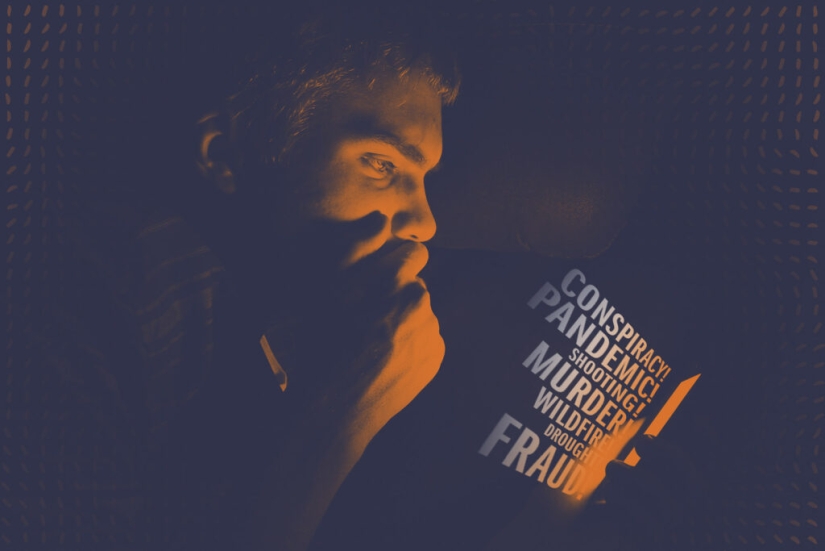What is thinkscrolling and why is its epidemic affecting more and more people
Categories: Social Networks
By Pictolic https://pictolic.com/article/what-is-thinkscrolling-and-why-is-its-epidemic-affecting-more-and-more-people.htmlThe term doomsrolling has appeared relatively recently. Despite the tricky name, this phenomenon is well known to most of us. In simple words, mind scrolling is the habit of flipping through news feeds in search of negativity and "sticking" on it for a long time. What is behind this self-destructive behavior and how to deal with it?

Doomscrolling is when reading frightening news on the web tightens and does not let go until 3 am. It is exhausting, but at the same time it causes addiction, which is not easy to get rid of. For the first time, this phenomenon was discussed in 2020, at the height of the coronavirus pandemic. Now it is quite obvious that it is not going to leave us and, on the contrary, is only gaining momentum.

At first there was no clear definition of such behavior, but now it has been officially approved. Thinkscrolling is considered uncontrolled reading of negative news, for which users of social networks sacrifice sleep and rest, worsening their mental state. This is a compulsive and even masochistic practice.
It is well known that thinkscrolling existed before. People have always shown a special interest in bad news. In the 70s of the last century, the term "coefficient of the evil world" appeared. It meant people's conviction that they live in a more dangerous and evil-filled world than it really was. This belief in a cruel world was strengthened by watching bad news offered by television and radio.
The word doomscrolling itself consists of two components: "doom" (gloomy end, hopelessness) and "scrolling" (scrolling through content). The term was first used on Twitter in 2018, but it did not become popular then. But in the spring of 2020, when the coronavirus was rampant in the world, they remembered about it again. Due to quarantine restrictions, people began to spend more time online and read news and reports.

According to statistics, the number of Twitter users increased by 24, and Facebook by 27 percent. In the US, children began spending 50 percent more time on smartphones than before. Kevin Rose, a journalist from The New York Times, was one of the first to discuss this phenomenon. In his opinion, this is:
However, Rose designated this behavior with another word having the same meaning — doomsurfing. After that, they started talking about mind scrolling, and soon the word got into official American dictionaries. If at first it was used only in relation to news about COVID-19, then over time all negative news came under the definition.

In 2021, the flow of frightening news increased due to the Black Lives Matter movement and the storming of the Capitol. A new, even more powerful wave of mind scrolling has begun on the web. Then new hardships and tragedies came and the number of users exhausting themselves with bad news continued to grow.
Psychologists have a simple explanation for the widespread use of mind scrolling. Experts believe that this phenomenon is caused by a person's tendency to beware of dangers. Thanks to this quality, people survived in the harsh conditions of the primitive world. Doctor of Psychiatric Sciences Patricia Klan describes it like this:

People tend to think that if they know about the danger as much as possible, then they control it. In fact, this is not quite true. Thinkscrolling is an addiction that promises security and confidence, but acts exactly the opposite. We do not receive any benefits from the mass of negative information, but the harm from it does not cause doubts. Mind scrolling leads to fear, stress and depression. It can disrupt sleep and cause an imbalance in the metabolism.
Clinical psychologist Amelia Aldao calls mind-scrolling a vicious circle, from which it is difficult to escape:
We can say that the tendency to search for negativity is inherent in us by nature. This is one of the important mechanisms of self-preservation. But in its entire history, humanity has never had access to such a volume of information as in the Internet era.
But that's not all. It turns out that the creators of social networks have learned how to manage thinkscrolling well. They use the passion of millions to search for bad news for profit. The algorithms of most social networks give us negativity, dragging us into a vicious circle and forcing us to plunge deeper and deeper into the world of fear and madness.

The director of the addiction treatment center Plan Your Recovery, Ned Presnall, believes that algorithms specifically slip us content that causes rage and fear. It affects the brain centers responsible for survival.
The problem is growing like a snowball — the more we are interested in the negative, the more recommendation systems helpfully slip it to us. And we sit around reading the news and watching terrible videos for days, providing earnings to social networks and problems to ourselves.
Doctor of Psychiatric Sciences Lila R. Magavi researched the problem and stated that mind scrolling can lead to a chronic increase in the levels of stress hormones, cortisol and adrenaline. As a result, we get sleep disorders, anxiety, panic attacks and attention disorders.
Psychologists believe that the first step to victory over mind-scrolling may be temporary restrictions on Internet use. The situation will improve significantly if you force yourself to log off after 15 minutes of surfing. It also does not hurt to disable push messages, notifications for some applications and delete "favorite" bookmarks with negativity.

Before going to bed, it is better to turn off the smartphone or at least put it away from the bed. Some say that changing the gamut in a smartphone to black and white helps - this reduces the attractiveness of interfaces and graphic content. There are other ways to get rid of addiction.
Social media users who have realized the harm of mind-scrolling help each other in the fight against a bad habit. They leave reminders to their friends in correspondence that it's time to disconnect and live a little in the real world, where there is so much good. Messages from well - wishers look like this:

Agree, sometimes there is not enough someone nearby who could categorically take away the smartphone and send it to sleep. Have you ever encountered mind scrolling or are you one of the lucky few who escaped this fate?
Recent articles

It's high time to admit that this whole hipster idea has gone too far. The concept has become so popular that even restaurants have ...

There is a perception that people only use 10% of their brain potential. But the heroes of our review, apparently, found a way to ...

New Year's is a time to surprise and delight loved ones not only with gifts but also with a unique presentation of the holiday ...